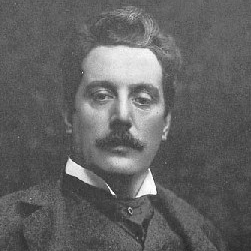
By Unknown author - Public Domain
Giacomo Puccini
Composer
Biography
Giacomo Puccini
Giacomo Puccini (1858–1924) was one of the most celebrated Italian opera composers of the late 19th and early 20th centuries, often regarded as the natural successor to Giuseppe Verdi. Born in Lucca, Italy, Puccini came from a long line of church musicians but sought a broader path, eventually studying at the Milan Conservatory. Influenced by composers such as Verdi and Wagner, he developed a musical voice that combined Italian lyricism with lush orchestration and a heightened sense of theatrical drama. His operas quickly became known for their emotional immediacy and their ability to captivate audiences across Europe.
Puccini’s first major success came with Manon Lescaut (1893), which established him as a rising star in Italian opera. This was followed by a string of masterpieces that defined his reputation, including La Bohème (1896), Tosca (1900), and Madama Butterfly (1904). Each of these works blended soaring melodies with deeply human stories, making them some of the most beloved operas in the repertoire. His ability to create characters that felt both larger-than-life and profoundly relatable marked a shift toward a more modern, realistic style of opera, known as verismo.
Beyond his melodic gift, Puccini was a master dramatist. His works often centered on ordinary people caught in extraordinary circumstances, with themes of love, sacrifice, betrayal, and tragedy at their core. He had a keen sense of theatrical pacing, ensuring that music and drama worked hand in hand to sustain tension and emotional impact. Puccini also experimented with exoticism in his operas, incorporating Japanese and Chinese motifs in works like Madama Butterfly and Turandot, reflecting both the fascination and the limitations of Western views of the East at the time.
Despite his successes, Puccini’s personal life was filled with turbulence. He faced frequent financial pressures, health struggles, and scandals, including a highly publicized controversy surrounding the suicide of his maid, which damaged his reputation. He also struggled with creative blocks in his later years, especially while working on his final opera, Turandot. Nevertheless, Puccini’s fame grew steadily during his lifetime, and his works quickly spread across the globe, cementing his status as one of the most performed opera composers in history.
Puccini died in 1924 in Brussels while undergoing treatment for throat cancer, leaving Turandot unfinished. The opera was later completed by Franco Alfano and premiered in 1926 at La Scala, conducted by Arturo Toscanini, who famously laid down his baton at the point where Puccini’s score ended. Today, Puccini’s operas remain staples of the international opera stage, cherished for their unforgettable melodies and their poignant exploration of human emotion. His legacy endures as a bridge between the grand traditions of 19th-century opera and the dramatic immediacy of the 20th century.
Shows
Shows associated with Giacomo Puccini
Monologues
Monologues from shows associated with Giacomo Puccini
Songs
Songs from shows associated with Giacomo Puccini
Scenes
Scenes from shows associated with Giacomo Puccini
Videos
Videos associated with Giacomo Puccini
Quizzes
Quizzes associated with Giacomo Puccini
Learning Modules
Learning modules associated with Giacomo Puccini
Additional Information
N/A